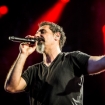For too long, Daron Malakian has been waiting to share the noise in his head. With System of a Down, the guitarist/vocalist created a sound that was wild and unpredictable, colliding metal riffs with ancient folk, and words of rage with the playfully lewd. In partnership with singer Serj Tankian and the rest of the band, Malakian broke all rules while going multi-platinum, but when System went on hiatus in 2006, the group's glorious madman lost his main outlet.
Long-suffering System fans could at least take comfort in the idiosyncratic solo projects of scattered band members. Malakian quickly started a new band called Scars on Broadway and recorded a critically acclaimed debut album (with SOAD drummer John Dolmayan) and began playing gigs. But Scars were barely off the ground, releasing Scars on Broadway in the summer of 2008, when Malakian abruptly shut the band down with no explanation, canceling a planned tour and mostly going into seclusion.
He reemerged for System's first reunion tour in 2011. While they've thrived as a live act in the years since, their occasional talk of recording new music hasn't led them back into a studio. Six years ago, Malakian recorded a second Scars album on his own, playing each instrument himself, and yet chose to sit on those tracks in case they were needed for a new System album. He's tired of waiting.
This July, he will release Dictator, his first album of new music in a decade, under the name Daron Malakian and Scars on Broadway. The first single is "Lives," which marked the 103rd anniversary of the Armenian genocide with lyrics and a vivid music video that celebrate the culture that survived that tragedy: "We are the people who were kicked out of history/We are the people who exist in victory."
There is also the tense, SOAD-like metal of "Angry Guru" and the instrumental "Gie Mou," blending Mediterranean folk and spaghetti western twang on electric guitar. In the coming year, he'll bring the music of Dictator and other songs on the road, where he hopes to demonstrate to fans that he's fully back in action as a creative force.
"I really enjoy when people take a song and make it their own," Malakian enthuses. "That's when they can see their own life inside a song."
YOU'VE SAID THE MUSIC ON DICTATOR HAS BEEN FINISHED FOR SIX YEARS.
DARON MALAKIAN It's been completely finished for a while. I actually have a whole new batch of songs that I'm about to go into the studio in the next few months and record. There will probably be a follow-up to this album sometime next year. It's nice after such a long time to get something out and get something going.
WHEN YOU FIRST GOT SCARS ON BROADWAY GOING, THINGS WERE JUST GETTING IN MOTION WHEN YOU STOPPED IT SUDDENLY. WHAT HAPPENED?
At that time, System had just stopped, so I felt like I had to start this brand new thing. I'm not sure it was the right time for me to do something new — creatively, emotionally. I was doing it because I felt like I had to start something new. I'm doing it this time because I want to do something. It was just a little soon after System of a Down had stopped. I should have taken more time.
DO YOU REGRET ANY OF THE MUSIC YOU PUT OUT?
Oh no. I think that album is some of the best stuff I've ever written. The fact that people are still into it right now almost pays homage to those songs. Those songs are strong. It was more about putting in the time with the press and going out and doing all the things that it takes to support the music that I wasn't ready for at that point.
YOU WERE PROBABLY GETTING A LOT OF QUESTIONS ABOUT THE FUTURE OF SYSTEM.
Yeah, and things were dark and in the air that I didn't have answers to a lot of people's questions. I would get frustrated and at some point I'd find myself getting angry [laughs] at the person that was interviewing me. At that time, I just didn't know what was going on with System. Now I have a more clear picture where everything is at, which makes me more comfortable to move forward with what I want to do with Scars.
THIS NEW RECORD, YOU RECORDED COMPLETELY SOLO, DIDN'T YOU?
This record I did all myself. There was no band in the studio. I recorded all the drums — I did everything. The band is mainly a live band. Even the first album, the instruments were played by me, and John played the drums. The band that you saw was mainly a live band, not a studio band.
DID YOU FIND THAT YOU LIKED WORKING LIKE THAT, PIECING IT TOGETHER BY YOURSELF?
I really enjoyed it. Playing the drums is something I always wanted to do on an album, so I got to do that this time. I found that it was easier for me, instead of teaching everyone the parts and rehearsing for months before we went in there. I already knew all the arrangements. It didn't take me very long either. I think I was done tracking in around a week.
IS THERE SOMETHING THAT SEPARATES THE WORK YOU DO WITH SCARS FROM WHAT YOU DO WITH SYSTEM?
Aside from the members of the band performing the songs, I really approach it the same way. When I bring a song into System, it's pretty much ready. I show them the song with my guitar and I sing all the parts. The creative process is not too different. The first Scars album was more in a rock direction. But on this second album, I hear more of that heavy-metal influence that's in System. This album is closer to a System of a Down album than the first Scars album was. I just wanted to make something that was heavier.
AS SOMEONE INSPIRED BY THAT KIND OF SOUND AND ENERGY, HOW DO YOU FEEL WHEN YOU'RE PLAYING METAL ONSTAGE?
It's like therapy. When I just finish a set with System or with Scars, I feel like there is this tension that goes away — I feel really relaxed after a show. Even just listening to heavy music is a release. For some people it's an angry release. It does something to you physically and mentally that other kinds of music don't do. It brings out this aggressiveness. After I finish playing a show, I feel like I just got out of a sauna. I'm definitely not the same person onstage as I am sitting on my couch.
LAST OCTOBER, YOU TOOK PART IN LINKIN PARK'S HOLLYWOOD BOWL TRIBUTE TO CHESTER BENNINGTON, AFTER HE COMMITTED SUICIDE THAT SUMMER. WHAT WAS THAT EXPERIENCE LIKE?
I was very shocked when I heard what happened. Anytime I was around him, Chester never came off as somebody who was depressed. One time I was backstage and I was feeling really down, and he walked in and just totally lifted my spirits. He was that kind of guy. He was high energy. I worked with him and Mike in the studio [on Linkin Park's 2014 song "Rebellion"]. Both those guys were really easy to work with, no ego about it. I'm really proud of that song.
Playing that show was interesting. They have a lot of playback going on in the monitors from a click track. His vocals were part of that playback, so when we were playing the song and singing, I could hear Chester's vocals coming through the monitors. I remember his band telling me in rehearsals that hit them in a hard way. That must have been tough on them in a lot of different ways. My heart goes out to his band. It's tough being in a band that's touring and all of a sudden they're like: What do we do now? It's a life-changer for a lot of people.
THE FIRST SONG REVEALED FROM THE NEW ALBUM WAS "LIVES," WHICH HAS A MESSAGE CONNECTED TO THE ARMENIAN GENOCIDE.
As an Armenian, we grew up learning about what happened to our grandparents and great-grandparents in the genocide. Even though I always want to pay respect to those who died, "Lives" is more about the people who survived and their grandchildren down to who we are now. I wanted to give a morale booster to my people. Instead of dwelling on how this happened to us, and our lands were taken away, and one-a-half-million of us or more died. I wanted to shine a light on the people who survived, and where we have come since then.
THAT CAUSE THAT HAS BEEN CONNECTED TO SYSTEM OF MANY YEARS. IT'S PERSONAL AND IMPORTANT TO ALL OF YOU.
No doubt, and I'm very proud of everything we've done in System. I always try to express myself in song. I'm not the guy that stands on a pedestal and tells people how to think. My pride in being Armenian has always been expressed in song. So "P.L.U.C.K." and "Holy Mountain" are both songs that I wrote. This is another one that expressed how I feel about my culture and my background and my roots. I'm not much of a political activist at the end of the day.
For me, the Armenian Genocide and singing about Armenian topics have nothing to do with politics. Other members of my band have a different way of expressing themselves about these topics. But for me, I always like to express myself in songs and lyrics and leave it there and not get too preachy about it.
WHAT CAN YOU TELL ME ABOUT THE SCARS SONG "ANGRY GURU"?
It's a real frantic song. It mixes thrash, black metal, death metal with groovy, funky rhythms. The topic is an imaginary person of this guru who is frustrated. It was a character that I made up. [Laughs] If one song really has a System of a Down style to it, that one is extremely Systemesque.
THE SECOND-TO-LAST TRACK ON THE ALBUM IS AN INSTRUMENTAL CALLED "GIE MOU." THAT'S AN INTERESTING PIECE OF MUSIC.
It's an old Greek song. It means "My Son." My uncle spent a lot of time in Greece, so he brought to the United States a lot of Greek music. As a kid I would listen to a lot of that music. That stuck with me. I decided to do an instrumental version of that song because I always loved the melody. I had no idea what he was singing, what he was saying. It's a really pretty song and it's a sad song.
My guitar influence has a lot of bouzouki in it. I always loved this song, and I wanted to do an instrumental because I don't sing in Greek. It's one of my favorite parts of the album because it's so unexpected.
YOU'VE OFTEN MADE UNEXPECTED CHOICES ON COVERS, INCLUDING DIRE STRAITS' "SULTANS OF SWING," CHANGING THE CHORUS LYRICS TO SAY, "WE ARE THE SYSTEM, WE ARE THE SYSTEM OF THE DOWN."
I always like to do covers in my own way. On the new album, there's a song called "Assimilate," which is a Skinny Puppy song. The Skinny Puppy version is all electronic and industrial and a totally different thing. If you're going to cover a song, you've got to do it with your touch. You have to show how that song influenced you to be who you are — not necessarily copying what they are.
System even did a Black Sabbath cover back in the day with "Snowblind" and it sounds nothing like the original. Even the Sabbath guys were so into it that Bill Ward came up to me — we were opening up for Sabbath [in 1999] and they asked us to play the song live. We can't play a Sabbath song before Sabbath is about to play! I felt weird about that, but Bill Ward convinced me to play the song. Those guys are everything when it comes to metal, so for them to be into it — words can't express how I felt about that.
ANOTHER SONG FROM YOUR PAST IS "A.T.W.A.," FROM TOXICITY, AND INVOLVES CHARLES MANSON, WHO RECENTLY DIED IN PRISON.
I've never really been interested in the murders. It was more about the person. The way I got attracted to Manson was through his interviews, and how he put his words together and articulated himself and his viewpoints on society. There are certain things he said that he put in a certain way that is very artistic. That's what drew me to Manson. Even "A.T.W.A." has nothing to do with killing or murder. It's more about the man. I almost wanted to shine a different light on somebody that people usually put together with murder and blood and horrible things. I wanted to take a different approach on the Manson thing and show a different side of it.
YOU'VE SAID THAT ONE OF THE REASONS YOU SAT ON THE SECOND SCARS ALBUM FOR YEARS WAS BECAUSE YOU THOUGHT THE SONGS MIGHT BE NEEDED FOR A NEW SYSTEM ALBUM.
System still plays live, and there was always this talk of maybe we'll do something, maybe we won't do something. So I was like, "Maybe I should save these songs." That's the biggest reason why I took so long to release these songs. There was this constant chatter amongst ourselves of maybe doing an album together. But enough time has passed that I don't want to wait anymore. It feels really good to let these songs loose. Honestly, almost anything that I write works for either band. What you're hearing [in the music] is my writing style. Anything that I write usually comes with those flavors.
DOES THAT MEAN THERE WON'T EVER BE ANOTHER SYSTEM OF A DOWN ALBUM?
I couldn't say ever, but as of right now, it's not looking like we're doing something together soon. I can't close the book on it and say it's done forever. We still play live. We're all still friends. All my band members posted "Lives" on their own Facebooks and Instagrams, so we're all very supportive of each other. It's more a combination of where each person is at a different point in their life, and each person wants to do a different thing. There are some creative differences as well on what direction each one of us wants to take the next System album, if that ever happens. Which is fine. I'm not sitting here upset or anything. The only thing I'm a little frustrated with was waiting for that to maybe happen or not happen. Too much time has passed by since I've released anything with Scars or System. But it's never too late.
ARE SYSTEM FANS SUPPORTIVE OF SCARS?
When I put out the first Scars album, I felt a different energy from the fans. The first time around, I felt a lot of, "Well, it's not System. When are we gonna get System?" And when I put out the song "Lives" I felt a more positive energy from the fans. Now, I've been hearing people say, "Hey, put out more Scars!" — a real positive vibe towards Scars, which makes it feel all the better.








